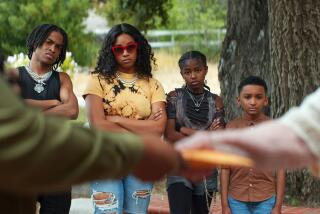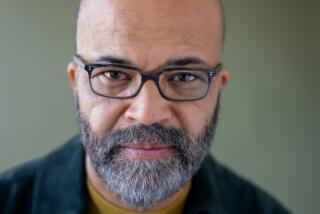‘The Spectacular Now’ and other films coming of (a new) age
Director James Ponsoldt was 16 when he first saw Lloyd Dobler stand on Diane Court’s front lawn and declare his love for the blue-eyed beauty who was both out of his class and out of his league. With the help of Peter Gabriel’s lyrics and John Cusack’s blaring boom box, Cameron Crowe’s “Say Anything” had just rocked his world.
“It changed my life when I saw it, it genuinely did,” Ponsoldt said of the 1989 cult favorite. “I totally fell in love with Diane Court [Ione Skye]. I had the poster on my wall. I was hooked.”
PHOTOS: Pivotal passages - A look at coming-of-age movies of the past
Now Ponsoldt, 34, is hoping his movie “The Spectacular Now,” the adaptation of Tim Tharp’s teen novel about a freewheeling party man who meets an atypical “nice girl,” will have the same effect on a new generation of moviegoers, one more accustomed to a world of fantasy and superheroes where growing up takes a back seat to surviving alien invaders.
“The Spectacular Now” is one of several coming-of-age movies this summer made by directors inspired by filmmakers of the 1980s — Crowe, John Hughes, Rob Reiner and Steven Spielberg — who hope to make similar connections to today’s teens and young adults. But whereas the ‘80s directors were preoccupied with issues of class and social status, today’s filmmakers are questioning what’s it like to grow up in the age of the Internet, helicopter parenting and the glorification of arrested development.
Director Jordan Vogt-Roberts viewed his ethereal, image-heavy tale “The Kings of Summer” as a “Stand by Me” for the video game generation, while Nat Faxon and Jim Rash, the writer-director pair behind the new indie “The Way, Way Back,” found their fish-out-of-water tale tonally aligned with Crowe and Hughes with touches of Ivan Reitman’s “Meatballs” thrown in for good measure.
As for Ponsoldt, “The Spectacular Now” could be seen as a follow-up to “Ferris Bueller’s Day Off,” after the fairy tale of the perfect day wears off.
But in contrast to the 1980s, when coming-of-age movies and romantic comedies were mainstream fare, today’s tales of growing up and figuring it out have been relegated to the low-budget indie scene. That’s an advantage, in a way, for filmmakers, who can experiment more freely since the budgets are relatively small, but a disadvantage for mass audiences, who may have to look harder to find their personal stories on the screen.
“At a certain point you stopped seeing yourself as a teenager in movies — unless you’re a vampire, unless you have super powers,” said Ponsoldt. “But what about the ones where it’s just me? The purpose of good storytelling is to make yourself feel less lonely, to make yourself feel less alone, and you need that when you’re 13, 15, 16. You need those movies, and they have not been made. I think this is something of a call to arms.”
Lords of the flies
In “The Kings of Summer,” which was released in May, three teenagers frustrated with their confining family lives set off to live in the woods despite being woefully ill-equipped to do so.
Vogt-Roberts, 28, plays with tone, splicing together ethereal, lyrical images with conventional scenes of teen comedy to give the classic story line a fresh coat of paint — picture a mix of Crowe and Terrence Malick. The director feels the movie serves as a commentary on the issue of masculinity in 2013 via entitled protagonists suffocating under the thumb of overbearing parenting. His teenage boys are thrilled to live off the land but find themselves cheating and sneaking over to a nearby fast-food chain to fulfill what they can’t do on their own.
“Much of this movie is about grappling and wrestling with what masculinity is for the kids raised generations after the ‘Stand by Me’ kids,” said Vogt-Roberts, making his feature film debut after working in television and shorts. “We are not men. We are a generation of wusses. Those kids could actually [survive in the woods]. Our kids are faking it. What does that mean?”
PHOTOS: Pivotal passages - A look at coming-of-age movies of the past
In “The Spectacular Now,” which opens Aug. 2, Miles Teller plays Sutter Keely, the extroverted party animal destined to peak in high school. Growing up with only a spectral presence of a father, played by Kyle Chandler, Keely hides his abandonment issues with alcohol, corrupting his new girlfriend, played by Shailene Woodley, along the way.
Poor parenting is the norm in many of these films. Some are just absent or uninvolved, others are clueless or, at their worst, needlessly cruel. The sympathetic parents of Spielberg’s suburbia often give way to self-involved adults who view their own children as inconvenient distractions.
Author Tharp originally created the character in his young-adult novel to explore what really happens when you live in the now, hiding from both the past and the future. Ponsoldt, an Athens, Ga., native who filmed the movie in his hometown, was drawn to the material as a way to move beyond the glorification of such a character and into a realm where those actions have consequences.
The screenplay by the “(500) Days of Summer” team of Scott Neustadter and Michael H. Weber also served as a rebuke to the many male characters depicted in film today, the grown man-child often played by “Saturday Night Live” alums such as Will Ferrell and Adam Sandler(the latter’s new movie, “Grown Ups 2,” celebrates that lifestyle). To flip that idea on its head, Ponsoldt cast Kyle Chandler, best known as the esteemed Coach Taylor from “Friday Night Lights,” as the deadbeat dad, inverting every idea of manhood his former character represented.
PHOTOS: Behind-the-scenes Classic Hollywood
“I think we glorify these characters that are essentially narcissists that refuse to grow up,” said Ponsoldt, who previously wrote and directed the indie “Smashed,” about a married couple whose love of drinking rivals their love for each other. “If you’ve been raised by one of those guys, if that guy divorced your mother when you were 9, or you’re a woman and were left by guys like that, cheated on by guys like that or abused by guys like that, I think you have less of a threshold for it.”
Looking for guidance
That theme of teens being raised by immature adults is also taken up in the recently released “The Way, Way Back.” Faxon, 37, and Rash, 42, the screenwriting duo who won an Oscar with Alexander Payne for 2011’s “The Descendants,” penned the script about a teenager trying to find his identity during a summer vacation with his mother and her new boyfriend.
Their hero, 14-year-old protagonist Duncan (newcomer Liam James), is given few role models to emulate. His mother’s jerky lothario boyfriend played by Steve Carell is callous and self-centered, so he gravitates toward Sam Rockwell’s sweet-natured but emotionally stunted water-park manager Owen. It’s a character Faxon and Rash based on Bill Murray’s charismatic camp counselor from the 1979 comedy “Meatballs,” but this time it’s not played only for laughs. Duncan’s real father lives on the other side of the country and isn’t very interested in his son’s life, while mom (Toni Collette) is far more interested in her own reinvention.
“Duncan becomes stuck without a guide,” said Rash of his main character, who longs to be with his real father. “We wanted this kid to maybe be the smartest person in the room in his observations — which I think a lot of kids tend to be. We often don’t realize just how much they absorb.”
PHOTOS: Hollywood backlot moments
None of these coming-of-age movies are destined to be blockbuster hits. While last year’s heavy, male-centric drama “The Perks of Being a Wallflower” grossed close to $20 million, “The Kings of Summer” earned just $1.2 million despite debuting to positive reviews and a high-profile sale at this year’s Sundance Film Festival. “The Way, Way Back,” which cost around $5 million to produce, has had greater success, earning $1.9 million since it opened two weeks ago.
But the filmmakers have other goals in mind beyond success at the box office. Each one created their film with a purposeful timelessness in the hopes it could become more than the disposable popcorn fare that typically dominates the summer moviegoing season.
If they are really lucky, their movie posters may even make it onto the wall of a teenager’s bedroom, proof they had something insightful to say to an audience desperately looking for connection.
“I wanted to make a movie that kids will watch and believe in,” said Ponsoldt. “And I wanted to make a movie that is not so obsessed with the newness of 2013 or thinks that anything is different. Because I don’t. Things are not that different.”
More to Read
Only good movies
Get the Indie Focus newsletter, Mark Olsen's weekly guide to the world of cinema.
You may occasionally receive promotional content from the Los Angeles Times.






